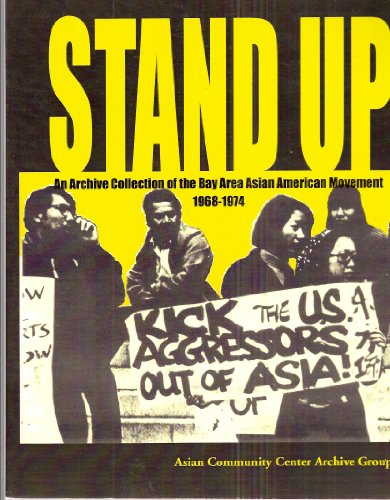What’s it about?
Stand Up is a powerful archival collection documenting the Asian-American movement in the Bay Area during a turbulent period of U.S. history (1968–1974). Through essays, pamphlets, posters, speeches, and personal testimonies, the book captures the struggles, voices, and resilience of Asian-American communities fighting for dignity, equality, and recognition.
Key Themes
- Racism and Discrimination: Asian Americans were frequently treated as perpetual foreigners. They faced workplace discrimination, housing segregation, and systemic exclusion from mainstream society. The Vietnam War era amplified stereotypes, and immigrants were often scapegoated or marginalized.
- Labor Exploitation: Many in the Asian community, particularly immigrants and working-class families, endured harsh labor conditions—long hours, low pay, and lack of protection. Stories highlight garment workers, restaurant staff, and farm laborers who organized for fair treatment.
- Identity and Solidarity: Young Asian-American activists began rejecting the “model minority” stereotype and instead embraced political solidarity with Black, Latino, and Native movements. The term “Asian American” itself became a unifying identity born out of resistance.
- Student Activism: College campuses like UC Berkeley and San Francisco State were epicenters of protest. Asian-American students joined Third World Liberation Front strikes demanding ethnic studies programs, better representation, and curriculum that reflected their histories.
- Community Organizing: Grassroots groups formed health clinics, legal aid organizations, and housing rights coalitions in Chinatown, Japantown, and Filipino neighborhoods. These were survival strategies against neglect and racism.
- Cultural Expression: Posters, poetry, and music became tools of resistance. Art celebrated heritage while confronting stereotypes, building pride in being Asian American.
How Difficult Life Was
The book reveals the everyday hardships: elders who worked decades in isolation, women who faced both sexism and racism, and families torn between assimilation pressures and preserving cultural identity. Many lived in cramped housing, struggled with language barriers, and were denied access to equal healthcare or education. Yet, through these adversities, resilience emerged. The collection is a reminder of how progress came at the cost of constant organizing, protesting, and speaking truth to power.
My Take
Reading this archive is both inspiring and sobering. It underscores how much Asian-American communities had to fight simply to be visible in American society. The racism they endured was not subtle—it was institutional, blunt, and dehumanizing. Yet the courage of ordinary people standing up transformed those years into a foundation for later generations. It left me reflecting on how fragile rights can be, and how essential solidarity is in confronting injustice.
Memorable Lines & Messages
- “We are not foreigners in our own land.”
- “Solidarity is our strength; silence is our enemy.”
- “The struggle for liberation is the struggle for visibility.”
- “Stand up, because our lives depend on it.”
